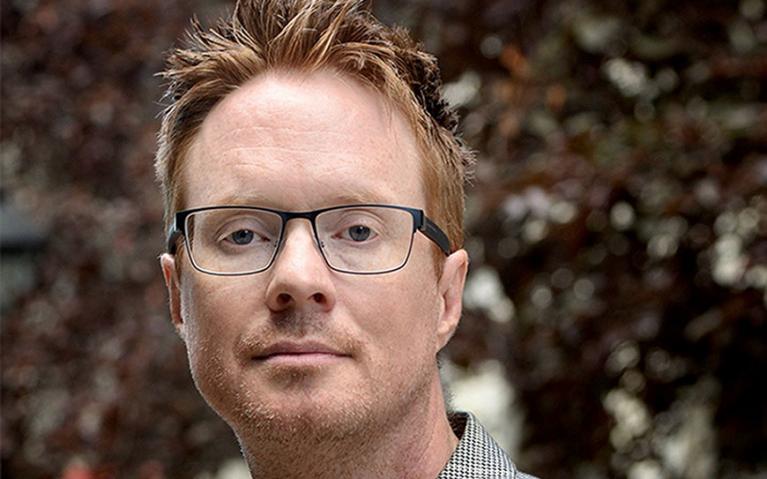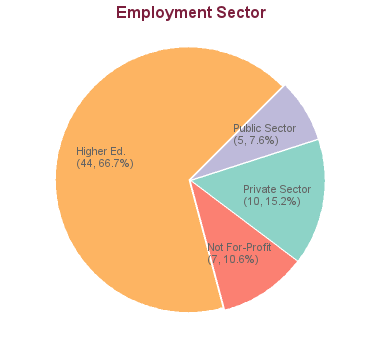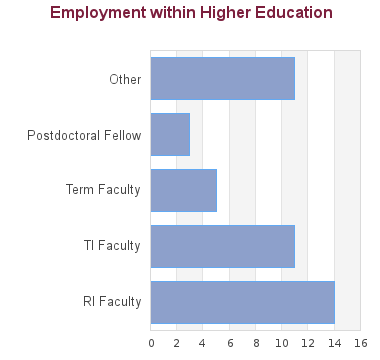
Olen Gunnlaugson
Job Title
Associate Professor in Leadership and Organizational Development
Employer
Université Laval

Review details about the recently announced changes to study and work permits that apply to master’s and doctoral degree students. Read more
The PhD in Educational Studies is a research-oriented doctoral program for students interested in any of the study areas offered in the department, such as adult and community education and social movements; citizenship and human rights; continuing professional education; cultural politics, critical multiculturalism and feminist studies; educational leadership and policy; epistemology (the study of knowledge and knowing), ethics, and political philosophy; equity in education (on the axes of race, disability, gender, class, and sexuality); Indigenous education; international and comparative education; media, popular culture and representation or youth and children in schools, families, and communities.
Students are required to take two first-year doctoral seminars and a second-year doctoral seminar. All other courses in a student's program are determined in consultation with faculty. Students in the PhD program typically devote two years to coursework, and two to four years to developing and carrying out a research project designed to make an original contribution to knowledge in the study area.
Please ensure you follow the instructions in the online application system. After submitting your application, it is the applicant’s responsibility to ensure that all supporting materials are submitted properly and by the application deadline. The Admissions Committee will only review complete applications. You can check the status of your application and supporting materials through the online application system.
The Faculty of Graduate and Postdoctoral Studies establishes the minimum admission requirements common to all applicants, usually a minimum overall average in the B+ range (76% at UBC). The graduate program that you are applying to may have additional requirements. Please review the specific requirements for applicants with credentials from institutions in:
Each program may set higher academic minimum requirements. Please review the program website carefully to understand the program requirements. Meeting the minimum requirements does not guarantee admission as it is a competitive process.
Applicants from a university outside Canada in which English is not the primary language of instruction must provide results of an English language proficiency examination as part of their application. Tests must have been taken within the last 24 months at the time of submission of your application.
Minimum requirements for the two most common English language proficiency tests to apply to this program are listed below:
Overall score requirement: 92
Reading
22
Writing
22
Speaking
22
Listening
22
Overall score requirement: 6.5
Reading
6.0
Writing
6.0
Speaking
6.0
Listening
6.0
Some programs require additional test scores such as the Graduate Record Examination (GRE) or the Graduate Management Test (GMAT). The requirements for this program are:
The GRE is not required.
All applicants have to submit transcripts from all past post-secondary study. Document submission requirements depend on whether your institution of study is within Canada or outside of Canada.
A minimum of three references are required for application to graduate programs at UBC. References should be requested from individuals who are prepared to provide a report on your academic ability and qualifications.
Many programs require a statement of interest, sometimes called a "statement of intent", "description of research interests" or something similar.
Students in research-based programs usually require a faculty member to function as their thesis supervisor. Please follow the instructions provided by each program whether applicants should contact faculty members.
It is very important to contact at least one EDST faculty member who could be a potential supervisor of your PhD work (i.e. has expertise and interest in the area and/or topic you want to focus on) and inquire whether they would be willing to supervise your work.
Permanent Residents of Canada must provide a clear photocopy of both sides of the Permanent Resident card.
All applicants must complete an online application form and pay the application fee to be considered for admission to UBC.
| Fees | Canadian Citizen / Permanent Resident / Refugee / Diplomat | International |
|---|---|---|
| Application Fee | $116.25 | $168.25 |
| Tuition * | ||
| Installments per year | 3 | 3 |
| Tuition per installment | $1,838.57 | $3,230.06 |
| Tuition per year (plus annual increase, usually 2%-5%) | $5,515.71 | $9,690.18 |
| Int. Tuition Award (ITA) per year (if eligible) | $3,200.00 (-) | |
| Other Fees and Costs | ||
| Student Fees (yearly) | $1,116.60 (approx.) | |
| Costs of living | Estimate your costs of living with our interactive tool in order to start developing a financial plan for your graduate studies. | |
Applicants to UBC have access to a variety of funding options, including merit-based (i.e. based on your academic performance) and need-based (i.e. based on your financial situation) opportunities.
All full-time students in UBC-Vancouver PhD programs will be provided with a funding package of at least $24,000 for each of the first four years of their PhD from September 2024. The funding package may consist of any combination of internal or external awards, teaching-related work, research assistantships, and graduate academic assistantships. Please note that many graduate programs provide funding packages that are substantially greater than $24,000 per year. Please check with your prospective graduate program for specific details of the funding provided to its PhD students.
All applicants are encouraged to review the awards listing to identify potential opportunities to fund their graduate education. The database lists merit-based scholarships and awards and allows for filtering by various criteria, such as domestic vs. international or degree level.
Many professors are able to provide Research Assistantships (GRA) from their research grants to support full-time graduate students studying under their supervision. The duties constitute part of the student's graduate degree requirements. A Graduate Research Assistantship is considered a form of fellowship for a period of graduate study and is therefore not covered by a collective agreement. Stipends vary widely, and are dependent on the field of study and the type of research grant from which the assistantship is being funded.
Graduate programs may have Teaching Assistantships available for registered full-time graduate students. Full teaching assistantships involve 12 hours work per week in preparation, lecturing, or laboratory instruction although many graduate programs offer partial TA appointments at less than 12 hours per week. Teaching assistantship rates are set by collective bargaining between the University and the Teaching Assistants' Union.
Academic Assistantships are employment opportunities to perform work that is relevant to the university or to an individual faculty member, but not to support the student’s graduate research and thesis. Wages are considered regular earnings and when paid monthly, include vacation pay.
Canadian and US applicants may qualify for governmental loans to finance their studies. Please review eligibility and types of loans.
All students may be able to access private sector or bank loans.
Many foreign governments provide support to their citizens in pursuing education abroad. International applicants should check the various governmental resources in their home country, such as the Department of Education, for available scholarships.
The possibility to pursue work to supplement income may depend on the demands the program has on students. It should be carefully weighed if work leads to prolonged program durations or whether work placements can be meaningfully embedded into a program.
International students enrolled as full-time students with a valid study permit can work on campus for unlimited hours and work off-campus for no more than 20 hours a week.
A good starting point to explore student jobs is the UBC Work Learn program or a Co-Op placement.
Students with taxable income in Canada may be able to claim federal or provincial tax credits.
Canadian residents with RRSP accounts may be able to use the Lifelong Learning Plan (LLP) which allows students to withdraw amounts from their registered retirement savings plan (RRSPs) to finance full-time training or education for themselves or their partner.
Please review Filing taxes in Canada on the student services website for more information.
Applicants have access to the cost estimator to develop a financial plan that takes into account various income sources and expenses.
74 students graduated between 2005 and 2013: 3 graduates are seeking employment; 1 is in a non-salaried situation; for 4 we have no data (based on research conducted between Feb-May 2016). For the remaining 66 graduates:


These statistics show data for the Doctor of Philosophy in Educational Studies (PhD). Data are separated for each degree program combination. You may view data for other degree options in the respective program profile.
| 2023 | 2022 | 2021 | 2020 | 2019 | |
|---|---|---|---|---|---|
| Applications | 58 | 77 | 80 | 65 | 83 |
| Offers | 10 | 7 | 7 | 10 | 8 |
| New Registrations | 5 | 7 | 3 | 6 | 5 |
| Total Enrolment | 48 | 51 | 54 | 58 | 59 |
Students in research-based programs usually require a faculty member to function as their thesis supervisor. Please follow the instructions provided by each program whether applicants should contact faculty members.
It is very important to contact at least one EDST faculty member who could be a potential supervisor of your PhD work (i.e. has expertise and interest in the area and/or topic you want to focus on) and inquire whether they would be willing to supervise your work.
These videos contain some general advice from faculty across UBC on finding and reaching out to a supervisor. They are not program specific.
| Year | Citation |
|---|---|
| 2017 | Dr. Xiao studied the political emotion of pride through activists, artists, and educators of various Chinese heritages in Greater Vancouver. Discovering the power of pride in grassroots mobilization and public representation, his study has brought new depth to intellectual activism, identity politics, and cross-cultural learning. |
| 2017 | Dr. Stein examined the colonial roots of the ethical and political challenges that arise in contemporary higher education internationalization efforts, and traced how these colonial roots shape contrasting ideas of global justice in this work. |
| 2017 | Dr. Christian examined how Indigenous cultural knowledge informs production practices when making films for Fourth World/Indigenous Cinema. Her work highlights the connections between land, story, and cultural protocols. This work will be of interest to social, political, film theorists and policy/decision makers who intersect with Indigenous arts organizations. |
| 2017 | Dr. Knowlton examined how indigenous Q'eqchi' Mayas' political encounters in defense of their ancestral territory in Guatemala resulted in moments of individual and collective learning. This research highlights the role of cultural continuity in Q'eqchi's' political organizing against extractive industries. |
| 2017 | Dr. Cowin analyzed federal and provincial government policy on both public and private post-secondary education in BC. His research centered on fair access for students, job preparation and marketization. His focus on long term trends across the entire post-secondary system will help policy makers better assess the cumulative implications of their decisions. |
| 2016 | Dr. Kang examined the lives of undergraduate exchange students between Canada and Korea through the lens of globalization, imagination, and space. She found that current exchange programs have reinforced contemporary social inequality. This study recommends creating more inclusive exchange programs by offering shared spaces between exchange and local students. |
| 2016 | Dr. Elfert examined the origins, features and shifts of UNESCO's approach to education and lifelong learning between 1945-2015. Her study contributes not only to the understanding of the conceptual and intellectual history of lifelong learning, but more broadly to the changes in global educational cooperation over the past 70 years. |
| 2016 | Dr. Robinson studied the integration of Indigenous knowledge at three Aboriginal post-secondary institutes in BC. Her research highlights the critical role of Elders in academia, the role of partnerships, and the resiliency of Aboriginal post-secondary institutes. This research will benefit Aboriginal education policy in Canada. |
| 2015 | Drawing on philosophy and moral psychology, Dr. Bigari explored the relationship between moral development and personal autonomy. He spoke to debates over these educational aims between liberals, communitarians, and fundamentalists. Dr. Bigari hopes this work will improve educational policies and practices in pluralist societies. |
| 2015 | To help Cambodia build a higher education system that matches its social needs and context, Dr. Phan did an analysis of international policy reforms and stakeholder interviews, to serve as an informed basis for future discussions. He suggested three policies Cambodia needs to change to improve relevance, affordability, sustainability, and quality. |
Educational Studies offers concentrations in Adult Learning and Education; Higher Education; Society, Culture and Politics in Education; and Educational Administration and Leadership.
Departments/Programs may update graduate degree program details through the Faculty & Staff portal. To update contact details for application inquiries, please use this form.

Find out how Vancouver enhances your graduate student experience—from the beautiful mountains and city landscapes, to the arts and culture scene, we have it all. Study-life balance at its best!